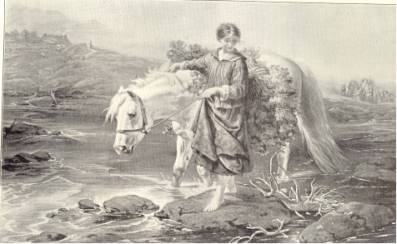
The author tries to tie this volume of 23 short stories together by
conjuring up a Latin American Scheherazade. To that effect, The Arabian
Nights are quoted and a prologue introduces the story-teller.
In my opinion, this does nothing for the book, whose stories hold themselves
together, because based on a common culture to the continent. I was going to
say the 'unifying' culture. But it seems to be a common culture that defies
unity. Isabel Allende's specimens of macho man offer reason enough why chaos
reigns rather than consent.
The Gold of Thomas Vargas serves up the suffering irresponsible men inflict on women left to rear the children in poverty. While, running thru the stories, the petroleum wealth oils everyone it touches. The laying waste to the forests is told from a supposedly native view-point, in Walimai.
And a recording angel could not make make a better case against the political sins, as well as the sexual ones. The first story in the book, Two Words, is actually the weakest, a pale imitation of the Eva Peron legend from Argentina, the neighbor of Isabel Allende's native Chile. The main character is one of the author's Latin American heroines of self-reliance.
It is to her credit that, also, she appreciates men, that women may slight, but have hidden worth, as in the story Tosca. Tho, this tale has no male villain. The heroine is merely a victim of a romantic vanity. A typical male complaint against women is that they are carried away by a bad lot. Allende's stories redress that grievance.
She never forgets the humanity even of her tyrants, brigands and revolutionaries. Left and Right have their share of villains. She can even make her heroes human and likable, as in A Discreet Miracle, possibly the best of several tirades against injustice, oppression and squalor. Her main characters tend to be exceptional or exotic people, whether good or bad. Humanity in the mass suffers on, whether at the hands of the tyrants, brigands and revolutionaries or from a natural catastrophe or some combination thereof, as in the last story, And of clay are we created.
The worst of the above-mentioned characters may escape justice but be caught by romance. In Phantom Palace, the old dictator abducts a woman, who takes pity on him but 'realized that his habit of distrust was much stronger than his need to yield to tenderness' and so 'lost interest in him and longed to escape...'
This story is one of Allende's most satisfying flights of fancy, absurdly far-fetched yet plausible in the light of governmental over-sight, with good somehow evading evil against all likelihood.
The stories of courtships stretch from gross enough to offend polite society to polite beyond the grossest comprehension, as in Toad's Mouth and The Little Heidelberg, respectively. The relations between the sexes stretch from the highest ideal of married love ( which unfortunately does not conquer all ) to criminal neglect, as in Interminable Life and If You Touched My Heart, respectively.
Just to measure the extremes doesnt do justice to the twists and inversions of fate under-gone by the characters. The captive sex-slave finds herself trailing to her abductor's prison. But their mentality, or lack of it, in their reversed situations, is not one of a conventional romance. Similarly, with regard to the out-come of Revenge. Allende is a psychological realist, if that realism recognises the need for the oxygen of romance in our routines: the story Wicked Child is a fair example of this.
Emotions dont follow rules and the most unlikely characters find themselves being enrolled by unexpected passion in the school of love, as in the light-hearted tale, Gift for a Sweetheart.
Less satisfactory is the tale of small-town vigilante justice, The Schoolteacher's Guest. A killing, which happens to be manslaughter rather than murder, is avenged by the mother of the victim, after many years.
The teacher is certain she recognised her son's killer. But the fact is that recognition tests of the accused, put in police line-ups, show how unreliable witnesses can be, the more so with time. After all those years, the avenged might just have been a relative or other look-alike.
Her friend arranges a local cover-up. As the author says, the avenged was a stranger. Had he been part of the community, summary justice would have split the folk between relatives and friends of slayer and slayed, respectively.
A feud would have been the most likely outcome. Hence, the need for law not vigilante justice. Granted the avenged was a stranger, he might still have family and friends to trace him and put two and two together, as to his disappearance. The vigilantes would have faced a reckoning of some sort. That is not to forget the repercussions on the imaginations of the teacher and her accomplices, the story says nothing about, as if nothing would change.
That story is an exception to Allende's well-crafted plots, tho I can't believe the out-come of The Judge's Wife, either. She could have found ways of dismissing her persecutor cum lover, to save him. To suggest, that she couldnt, is to under-estimate her sex, as to its pushing, as well as pulling, power.
At our reader's club, we are usually asked if the writer being reviewed has pulling power. Certainly, but Isabel Allende is working against the vices of a continent's political economy that have become depressingly familiar.
Richard Lung.